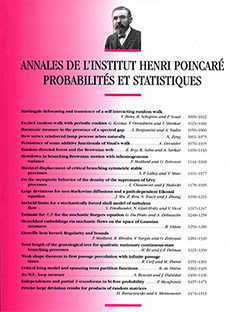Abstract
We present a new construction of a Skorokhod embedding, namely, given a probability measure $\mu$ with zero expectation and finite variance, we construct an integrable stopping time $T$ adapted to a filtration $\mathcal{F}_{t}$, such that $W_{T}$ has the law $\mu$, where $W_{t}$ is a standard Wiener process adapted to the same filtration. We find several sufficient conditions for the stopping time $T$ to be bounded or to have a sub-exponential tail. In particular, our embedding seems rather natural for the case that $\mu$ is a log-concave measure and $T$ satisfies several tight bounds in that case. Our embedding admits the property that the stochastic measure-valued process $\{\mu_{t}\}_{t\geq0}$, where $\mu_{t}$ is as the law of $W_{T}$ conditioned on $\mathcal{F}_{t}$, is a Markov process. In view of this property, we will consider a more general family of Skorokhod embeddings which can be constructed via a kernel generating a stochastic flow on the space of measures. This family includes existing constructions such as the ones by Azéma–Yor (In Séminaire de Probabilités XIII (1979) 90–115 Springer) and by Bass (In Séminaire de Probabilités XVII (1983) 221–224 Springer), and thus suggests a new point of view on these constructions.
Nous proposons une nouvelle construction d’un plongement de Skorokhod: étant donnée une mesure de probabilité $\mu$ avec espérance nulle et variance finie, nous construisons un temps d’arrêt intégrable $T$ adapté à la filtration $\mathcal{F}_{t}$, tel que $W_{T}$ possède la loi $\mu$ et $W$ est un processus de Wiener standard adapté à la même filtration. Nous trouvons plusieurs conditions suffisantes pour que le temps d’arrêt $T$ soit borné ou ait des queues sous-exponentielles. En particulier, notre plongement semble assez naturel dans le cas où $\mu$ est log-concave et $T$ satisfait plusieurs estimations fortes. Notre plongement a la propriété suivante : le processus stochastique à valeur dans les mesures $\{\mu_{t}\}_{t\geq0}$, où $\mu_{t}$ est la loi de $W_{T}$ conditionnée par $\mathcal{F}_{t}$, est un processus de Markov. Compte tenu de cette propriété, nous allons considérer une famille plus générale de plongements de Skorokhod qui peuvent être construits à l’aide d’un noyau générant un flot stochastique sur l’espace des mesures. Cette famille inclut des constructions déjà existantes comme celle d’Azéma–Yor (In Séminaire de Probabilités XIII (1979) 90–115 Springer) et celle de Bass (In Séminaire de Probabilités XVII (1983) 221–224 Springer), suggérant ainsi un point de vue nouveau sur ces constructions.
Citation
Ronen Eldan. "Skorokhod embeddings via stochastic flows on the space of Gaussian measures." Ann. Inst. H. Poincaré Probab. Statist. 52 (3) 1259 - 1280, August 2016. https://doi.org/10.1214/15-AIHP682
Information





